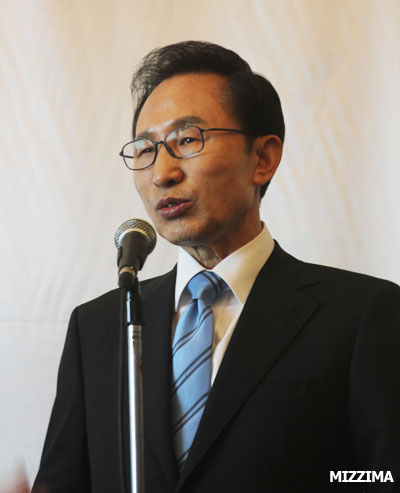Burmese President Thein Sein said Burma will no longer purchase arms from North Korea and it will honour U.N. weapons sanctions against the rogue country in meetings on Monday with South Korean President Lee Myung-bak.
 South Korea and Burma have moved closer as trading partners during Lee's two-day visit. South Korean business interests in Burma has grown in light of what it says are workers’ salaries about one-third that of China.
South Korea and Burma have moved closer as trading partners during Lee's two-day visit. South Korean business interests in Burma has grown in light of what it says are workers’ salaries about one-third that of China.
Burma also agreed to honor a U.N. resolution targeting North Korea over its controversial nuclear and missile programs, during Lee’s meeting with Thein Sein.
Thein Sein told Lee that Burma will no longer buy weapons from North Korea, honoring the U.N. ban, South Korean presidential official Kim Tae-hyo told reporters traveling with Lee, according to The Associated Press on Tuesday. In December, the U.S. had asked Burma to end any relationships it may have had with North Korea in terms of nuclear weapons or conventional arms. The U.S. has blocked North Korean ships it believed may have been carrying arms to Burma. Thein Sein told Lee that Burma had purchased conventional arms from North Korea in the past.
Ahead of his meeting with Aung San Suu Kyi on Tuesday, the South Korean leader pledged greater economic support to Burma while discussing ways to curtail its military ties with North Korea. Lee offered expanded loans and aid during Monday’s meeting in the capital of Naypyidaw and the two leaders agreed to increase cooperation on energy and resource development according to a statement from Lee’s office. Thein Sein asked Lee to set up a redevelopment program in the former capital of Rangoon, according to a spokesman in the South Korean presidential official.
Observers said Lee’s two-day visit underscores South Korean’s view of Burma as a prime trading partner, particularly in the energy field where Korea has large investments in natural gas.
In his press conference with Suu Kyi on Tuesday, Lee said his country wanted Burma to achieve both democracy and economic development.
Suu Kyi said: "This is exactly what we want in Burma. We want justice and freedom, and we want prosperity. Not either of it but all of it together. And President Lee understands perfectly that prosperity is no substitute for democracy."
Suu Kyi said she and Lee agreed on the importance of education, and she wants children to have access to a good education so they can shape Burma’s future. "A genuine democracy can only come when the people are empowered, and the people are confident that their future lies in their own hands, not in the hands of those who are ruling them," she said.
On Tuesday, Lee visited a mausoleum in Rangoon which honours victims of a deadly North Korean bomb attack that took place 29 years ago. Lee is the first South Korean president to visit since a North Korean bomb targeted then South Korean President Chun Doo-hwan and killed 21 people, including 17 South Korean officials and four Burmese. Chun escaped the attack unhurt. Although Burma severed diplomatic relations with North Korea after the attack, it revived ties with the reclusive country in 2007. In the wake of the 1983 bomb attack, Burma increased security with hundreds of police officers as well as security personnel patrolling the streets in Rangoon.
Trade between the two countries amounted to $966 million in 2011, according to South Korean government statistics.
Burma exported US$ 299 million worth of clothing, beans, marine products, jade and timber to South Korea and imported $667 million of South Korean motor vehicles, engines, spare parts, tin and steel products, and raw plastic materials, officials said.
The South Korea government said that 108 Korean companies have invested $2.93 billion in Burma as of June 2011. South Korea is the fourth-largest investor in Burma after China, Thailand and Hong Kong.
Among the largest investors are Daewoo International Corp. and Posco, South Korea’s biggest rice trader.
The Obama administration has repeatedly cited Burma’s opening up to democracy as a possible model for North Korea to follow.


